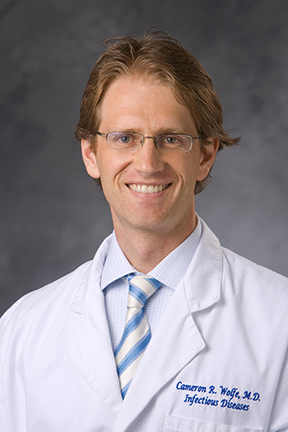DHVI Faculty Appointments - Cameron Wolfe
The Duke Human Vaccine Institute (DHVI) is pleased to announce that Cameron Wolfe, MBBS, has joined the DHVI as an affiliate faculty member, effective July 1, 2022. Dr. Wolfe is an associate professor of medicine and serves as the director of Biological and Emergency Preparedness for the Duke University Hospital System with a specific focus on influenza, SARS-CoV-2 and other respiratory viral pathogens. He has worked closely with the DHVI’s chief medical officer, Dr. Chip Walter, regarding the COVID-19 clinical trials, as well as several other faculty within the DHVI.

In our COVID-19 response, the DHVI launched four different clinical trials where Dr. Wolfe was the primary partner, evaluating different therapeutics and collaborating with Dr. Walter. Wolfe’s team was instrumental in conducting the ACTIV COVID-19 Treatment Trials evaluating novel COVID-19 therapeutics. He also referred participants to DHVI clinical trials, contributing to the DHVI reaching optimal enrollment in several studies.
Dr. Wolfe’s clinical interests are in the prevention of infection through vaccination and the management of patients with immunodeficiency syndromes, either through infection with human immunodeficiency virus, or acquired through solid organ and hematologic transplantation. “Within those spheres,” Dr. Wolfe says, “I have specific focuses on the outcomes of viral infections, including influenza, COVID-19, hepatitis and HIV, and infections in lung transplantation.”
Dr. Wolfe is also the medical director of the Duke Emerging Pathogens Unit, a core clinical and leadership response group, capable of clinical care of patients infected with high-consequence pathogens. Through this group, he has exposure to cutting edge research and clinical care for many high-consequence pathogens, most recently COVID-19. He is a co-chair for the Duke University Coronavirus Taskforce, as well as the Duke Flu Vaccine Taskforce, overseeing all management decisions for influenza and COVID-19 vaccination on the University campus and health system.
Dr. Wolfe has led efforts to expand organ donation at Duke University in the transplant space and improve recipient outcomes for patients with multi-drug resistant pathogens in the lung transplant program. Specifically, this has led to a clinical focus on prevention efforts, including optimal vaccination strategies for the immunosuppressed. He has led Duke University’s clinical response to COVID-19, including in transplanted patients, leading to a number of New England Journal of Medicine publications reviewing details on treatment options. Specific to influenza, he was also a member of the Infectious Diseases Society of America Influenza Treatment Guidelines Panel.
Dr. Wolfe is a current faculty member of the T32 Interdisciplinary Program in Transplant Infectious Disease. This program is a national first in class program to train physicians in the field of transplantation medicine, specifically from an infectious disease perspective. In addition to his teaching responsibilities in solid organ transplant and HIV, he teaches Fellows the theoretical and practical basis for outbreak prevention, and biosafety, serving as an Adjunct Instructor at The University of North Carolina at Chapel Hill. He holds advisory roles in the National Institutes of Health-funded Duke Vaccine and Treatment Evaluation Unit, having served as a vaccine safety monitor for CDC-sponsored vaccine studies of COVID-19 and influenza vaccination. Other advisory roles include a number of other National Institute of Allergy and Infectious Diseases-funded research programs in emerging infections, HIV, and Hepatitis C transplantation.
Nationally, Dr. Wolfe has held leadership roles within the Infectious Disease Society of America as a member of the Standards and Practice Guidelines Committee. He held national leadership roles through the Health Resources and Services Administration-funded United Network of Organ Sharing, both as Chair of the Disease Transmission Committee and as a UNOS/OPTN Board Member.
Dr. Wolfe says, “I will continue to focus future efforts on expanding vaccine safety, including ensuring safe protection of all subgroups of patients, especially the immunosuppressed. Furthermore, I shall continue to work in the areas of community disease surveillance, teaching, and training for hospitals and institutions.”